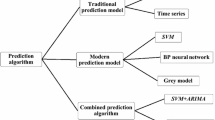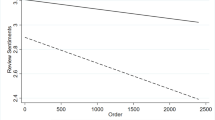Abstract
For the past few years, there has been increasing trend for people to buy products online through e-commerce sites. With the user-friendly platform, there is loop hole which does not guarantee satisfaction of the customers. The customers have the habit of reading the reviews given by other customers in order to choose the right product. Due to high number of reviews with mixture of good and bad reviews, it is confusing and time-consuming to determine the quality of the product. Through these reviews, the vendors would also want to know the future trend of the product. In this paper, a predictive analysis scheme is implemented to detect the hidden sentiments in customer reviews of the particular product from e-commerce site in real-time basis. This serves as a feedback to draw inferences about the quality of the product with the help of various graphs and charts generated by the scheme. Later, an opinion will be drawn about the product on the basis of the polarity exhibited by the reviews. Finally, prediction over the success or failure of the product in the regular interval of the timestamp is done using time series forecasting method. A case study for iPhone 5s is also presented in this paper highlighting the results of rating generation, sentiment classification, and rating prediction.
Access this chapter
Tax calculation will be finalised at checkout
Purchases are for personal use only
Similar content being viewed by others
References
Mohammad Salehan and Dan J. Kim, “Predicting the Performance of Online Consumer Reviews: A Sentiment Mining Approach”, Elsevier Journal on Information Processing and Management, 2016.
ShahriarAkter and Samuel FossoWamba, “Big data analytics in e-commerce: A systematic review and agenda for future research”, Electronic Markets 26 173–194, 2016.
Wikipedia, https://en.wikipedia.org/wiki/Predictive_analytics.
Pavithra B, Dr. Niranjanmurthy M, Kamal Shaker J and Martien Sylvester Mani F, “The Study of Big Data Analytics in E-Commerce”, International Journal of Advanced Research in Computer and Communication Engineering, 2016, Vol. 5, Special Issue 2.
Galit Shmueli and O. Koppius, “Predictive Analytics in Information Systems Research”, MIS Quarterly, 2011, Vol 35 No. 3 pp. 553–571.
Hu M and Liu B, “Mining and summarizing customer reviews”, In Proceedings of the tenth ACM SIGKDD international conference on Knowledge discovery and data mining, 2004, pp 168–177.
Rui Xia, FengXu Jianfei Yu, YongQi and ErikCambria, “Information Processing and Management Polarity shift detection, elimination and ensemble: A three-stage model for document-level sentiment analysis”, Elsevier Journal on Information Processing and Management, 2016, vol 52, Issue 1, pp 36–45.
Hu M and Liu B, “Mining and summarizing customer reviews”, In Proceedings of the tenth ACM SIGKDD international conference on Knowledge discovery and data mining, 2004, pp 168–177.
Yorick Wilks and Mark Stevenson. “The grammar of sense: Using part-of-speech tags as a first step in semantic disambiguation”. Journal of Natural Language Engineering, 1998, pp 135–144.
Pang B and Lee L, “A sentimental education: Sentiment analysis using subjectivity summarization based on minimum cuts”. In: Proceedings of the 42nd Annual Meeting on Association for Computational Linguistics, Stroudsburg, PA, USA, 2004, pp 1–8.
Jeonghee Yi, Tetsuya Nasukawa, Razvan Bunescu, and Wayne Niblack, “Sentiment analyzer: Extracting sentiments about a given topic using natural language processing techniques”, In Proceedings of the IEEE International Conference on Data Mining (ICDM), 2003.
Liu B, “Sentiment Analysis, and Opinion Mining. Synthesis Lectures on Human Language Technologies”, Morgan & Claypool Publishers, 2012, vol. 5, no. 1, pp 1–67.
Ellen Riloff and Janyce Wiebe, “Learning extraction patterns for subjective expressions”, Proceedings of conference on Empirical methods in natural language processing, 2003, pp. 105–112.
Author information
Authors and Affiliations
Corresponding author
Editor information
Editors and Affiliations
Rights and permissions
Copyright information
© 2018 Springer Nature Singapore Pte Ltd.
About this paper
Cite this paper
Tuladhar, J.G., Gupta, A., Shrestha, S., Bania, U.M., Bhargavi, K. (2018). Predictive Analysis of E-Commerce Products. In: Bhalla, S., Bhateja, V., Chandavale, A., Hiwale, A., Satapathy, S. (eds) Intelligent Computing and Information and Communication. Advances in Intelligent Systems and Computing, vol 673. Springer, Singapore. https://doi.org/10.1007/978-981-10-7245-1_29
Download citation
DOI: https://doi.org/10.1007/978-981-10-7245-1_29
Published:
Publisher Name: Springer, Singapore
Print ISBN: 978-981-10-7244-4
Online ISBN: 978-981-10-7245-1
eBook Packages: EngineeringEngineering (R0)




